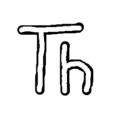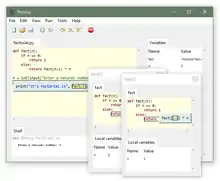 | |
 | |
| Developer(s) | Aivar Annamaa and contributors |
|---|---|
| Stable release | 4.1.4
/ November 19, 2023 |
| Repository | github |
| Written in | Python |
| Operating system | Cross-platform |
| Platform | Windows, Linux, macOS |
| Type | Integrated development environment |
| License | MIT |
| Website | thonny |
Thonny (/ˈθɒni/ THON-ee) is a free and open-source integrated development environment for Python that is designed for beginners. It was created by Aivar Annamaa, an Estonian programmer. It supports different ways of stepping through code, step-by-step expression evaluation, detailed visualization of the call stack and a mode for explaining the concepts of references and heap.[1]
Features
- Line numbers
- Statement stepping without breakpoints
- Live variables during debugging
- Stepping through evaluation of the expressions (expressions get replaced by their values)
- Separate windows for executing function calls (for explaining local variables and call stack)
- Variables and memory can be explained either by using simplified model (name → value) or by using more realistic model (name → address/id → value)
- Simple pip GUI
- Support for CPython and MicroPython
- Support for running and managing files on a remote machine via SSH
- Possibility to log user actions for replaying or analyzing the programming process
Availability
The program works on Windows, macOS and Linux. It is available as a binary bundle including the recent Python interpreter[3] or pip-installable package.[6] It can be installed via the operating-system package manager on Debian, Raspberry Pi, Ubuntu, and Fedora.
Reception
Thonny has received favorable reviews from Python and computer science education communities.[7][8][9] It has been a recommended tool in several programming MOOCs.[10][11] Since June 2017 it has been included by default in the Raspberry Pi's official operating system distribution Raspberry Pi OS.[12]
See also
References
- ↑ Annamaa, Aivar (2015). "Introducing Thonny, a Python IDE for learning programming". Proceedings of the 15th Koli Calling Conference on Computing Education Research. Koli, Finland: ACM. pp. 117–121.
- ↑ Annamaa, Aivar (2015). "Thonny, a Python IDE for learning programming". Proceedings of the 2015 ACM Conference on Innovation and Technology in Computer Science Education. Vilnius, Lithuania: ACM. p. 343.
- 1 2 "Thonny website". Retrieved 28 October 2018.
- ↑ "Thonny on a Raspberry Pi: Using the new Python IDE in Raspbian". The MagPi Magazine. Retrieved 28 October 2018.
- ↑ "Learn to code with Thonny — a Python IDE for beginners". Fedora Magazine. Retrieved 28 October 2018.
- ↑ "Thonny Python distribution". Python Package Index. Retrieved 28 October 2018.
- ↑ "Are you a Python newbie? Meet the IDE for beginners". JAXenter. Retrieved 28 October 2018.
- ↑ "New Term New Tool - Thonny, a Python IDE". C'est la Z. Retrieved 28 October 2018.
- ↑ "Python IDEs for beginners - Thonny, Geany or Idle". ProjectCodeEd. Retrieved 28 October 2018.
- ↑ "Installing Packages in Thonny". Python Data Visualization MOOC by Rice University. Retrieved 28 October 2018.
- ↑ "Thonny". Programming MOOC by University of Tartu. Retrieved 28 October 2018.
- ↑ "A Raspbian desktop update with some new programming tools". Raspberry Pi blog. Retrieved 28 October 2018.